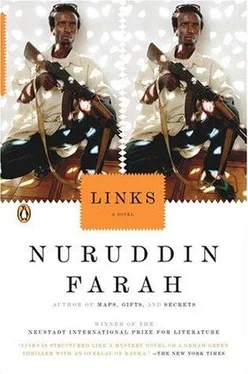When she paused, Jeebleh looked at Qasiir, and the youth grinned foolishly. He took up the story where his mother had left it. “I was the leader of the posse, wasn’t I? I had on a T-shirt that said ‘Frank James is alive and well and living in Mogadiscio,’ and I was tougher than all the others. We were useful as spies, my friends and I, and I was the one with the mobile. One of the top men of our militia had given it to me.”
Qasiir received instructions via the mobile from a man he had never met, a deputy commander to StrongmanSouth. When he was on the phone, he tried to impress his boys, remaining dramatically silent, nodding in agreement with the invisible commander. Now and then he would proclaim, “Of course I won’t share the secrets with anyone else!” Jeebleh imagined the boy switching off the phone and picking up a sliver of wood, placing it in his mouth, and pushing it about with his tongue in imitation of Clint Eastwood in A Fistful of Dollars.
In spite of the terrific noise created by the helicopters, Qasiir’s posse could hear every word he said, as he told them what to do. He might have been relaying a message received directly from the Almighty, each syllable delivered as though he were honoring it, each vowel drawn out in deference to StrongmanSouth. The boys couldn’t tell whether or not he was quoting someone when he said, “Remember that death visits you only once. And so our commander in chief says we must be ready for it, and must welcome it too. How do we achieve the impossible? Discipline.” He repeated the word “discipline” several times, until it had the force of an incantation.
They went into a huddle and piled their hands one on top of another, like basketball players at the beginning of a game. They also took a collective oath, reaffirming their fearless commitment to total war against the enemies of StrongmanSouth. They were ready to undertake risky missions now that the assault had begun in earnest.
“And to prove how we were prepared to die for our commander, one of my boys began chanting in rhythm to the rotating helicopter blades,” Qasiir said. And to Jeebleh’s amusement, he got up and started chanting an imitation of an American gangsta rap. He sang some sort of war cry, “Dill, dill, gaalka dill, dill, dill, gaalka dill!” and after a pause, chanted in English, rapping in rhythm and repeating the command “Kill, kill, kill all!” Qasiir’s acting was so effective that Jeebleh could hear, in his own mind, the chopper’s noise, razor sharp, the blades turning and turning.
The deadly birds continued to hover, Qasiir said, raising an immense cloud of sand. And as the blades rotated faster and faster, the noise grew louder and more frightening, until the swirling currents tore zinc roofing sheets from flimsy dwellings and ripped cardboard from the walls of lean-tos serving as dwellings. A few odd pieces of plywood, no nails to hold them down, were blown away as well.
Qasiir’s mother interrupted her son. “None of this mattered to the helicopter pilots or the soldiers in their funny-looking vests! It was siesta time in Mogadiscio, when we all sought shelter from the scorching sun. But on that day it felt like the entire earth was caught up in waves of tremors, each tremor speeding up the pulse of every person or animal in the neighborhood.”
Qasiir rose to his feet, acting out more of that day, and Jeebleh was able to imagine the accelerated heartbeats of the ailing, the panting lungs of the infirm, the thrashing of the alarmed, the sand funneling in a mighty whirlwind, people cowering in their shacks, curses spoken, spells cast, homes destroyed, businesses disrupted, lives suddenly ended.
Qasiir’s mother described the horrific terror of her baby — then barely a year old — who, torn from her breast, had been caught up in the avalanche of courtyard sand stirred up by the rotors of the helicopters. And when the mother went on her knees, keening in supplication, praying, cursing, cursing and praying, Jeebleh stared, dumbfounded, now unable to imagine the terror.
“I became hysterical,” she continued, “and tore at my bare breast, where my daughter had been nursing. I wailed, I wept, I cursed, I prayed, but to no avail. I tore at my clothes, until I disrobed, convinced that my child had been swallowed up in the sand raised by the helicopter’s sudden arrival. Then I saw the shape of evil. Rangers pointing at my nakedness and laughing. I stopped wailing, and covered my indecency, and then cursed the mothers who bore these Rangers. I’ve never glimpsed worse evil than those men cupping their hands at me, their tongues out, pointing at my nakedness.”
Qasiir and his team heard her wailing. He shouted to his posse, instructing them not to shoot at the helicopters, fearing that his baby sister might be hurt in the crossfire. Looking back, both Qasiir and his mother speculated that one of the pilots might have become aware of what was going on and, in an effort to help, might have steered away from where the mother knelt, naked, weeping, praying, cursing, wallowing in the sand. “Then”—Qasiir acted it out in a wild charade—“two men appeared from nowhere with RPGs, and they gunned for the chopper. There was a mighty crash: the helicopter was down!”
“And I wouldn’t stop wailing,” his mother broke in, “until I saw my baby fall to the ground, close to where I was. I crawled on all fours to where my daughter lay, praying that I would find her alive, and unhurt. All the while, my hard, evil stare was focused on the Rangers in the downed chopper. I lifted my baby into my embrace, and half ran, half walked away, aware of the Rangers’ eyes trained on my back.”
THE STORY WAS OVER, THE MOTHER CLEARLY EXHAUSTED, AND JEEBLEH, NOW prepared to leave, got to his feet. Without thinking, he reached into his shirt pocket and handed over a large sum of money in the local currency — his change from the restaurant — to the mother of the child. The woman looked at her father-in-law, as if to ask, “What am I to do with this?”
“Please let her buy something for the child.” Jeebleh’s words failed him. He was embarrassed by what he had done so thoughtlessly. He walked out of the compound and, with feelings of guilt weighing him down, waited for Dajaal to join him.
ON THEIR WAY TO THE BARBERSHOP, JEEBLEH, HIS EXPRESSION FORLORN, relied on the strength of his own spirit to overcome the obstacles in his way.
He decided to approach Dajaal right away with specific demands, even at the risk of being turned down. He did not have all the time in the world: soon he would be returning home, back to his family and his teaching: from that distance, a Parthian shot at his present pursuers and his lifetime foe would be impossible. He wanted the job done, and done well — in and then out.
And there was another matter he needed to consult Dajaal about. Jeebleh wanted to hire a mason to build a miniature mausoleum in noble memory of his mother. Nothing extravagant, just a bit of stone neatly put together, in tribute to the woman who had built him into what he had become. His skin bristled as he thought ahead to the moment when, standing before the structure, he could say a prayer or two, in an effort to apologize for his failures. It would take a great deal of love, and more, to help her spirit lie in undisturbed peace.
He looked in Dajaal’s direction. The man seemed uncomfortable. “There are two jobs I would like to hire someone to do,” Jeebleh said. “Two jobs that are related, to my mind. Would you help me?”
“What are these jobs?”
Worry spread over Jeebleh’s face; he looked as wretched as a rusted drainpipe. “How would you go about it if you wished to commission a risky job?”
Dajaal’s cagey answer made it obvious to Jeebleh that the man knew where he was headed with his questions. “I wouldn’t, for instance, commission my grandson Qasiir to perform a risky job. It would have to be performed on a no-name, no-packdrill basis, with payment on execution.”
Читать дальше












